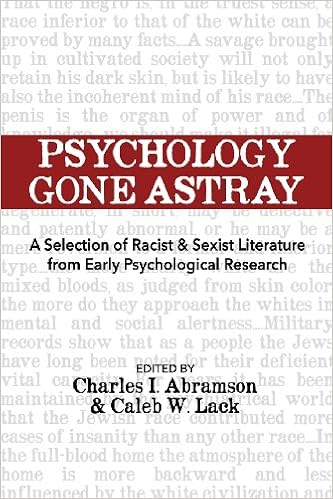By Dr. Caleb Lack
In the relatively short history of psychology as a science, our understanding of human behavior, cognition, emotion, and perception has moved forward in leaps and bounds. This knowledge is frequently applied today to help make improvements in people’s lives, from more effective therapies for the mentally ill to educational strategies to increased work productivity.
But if we step back in time only a few decades, we find psychologists playing a key role in a very different effort: the attempt to support racist and sexist attitudes and policies with results from experiments and other forms of research. This book provides a window into this period, reprinting over 20 journal articles from the late nineteenth and early twentieth centuries with commentary from noted educators Abramson and Lack. Will we continue to twist science to fit our preformed beliefs or can we learn from the mistakes of our past?
“This is an important contribution to the literature in psychology regarding a very uncomfortable time in our history. I applaud the authors for taking on this challenging topic and shining light on this dark time in the history of social science.” Dr. Robert Mather, Associate Professor of Experimental Psychology, University of Central Oklahoma
Here are some reviews from Amazon:
This is an excellent treatise on what has been wrong and could continue to go wrong with psychology today. it provides enlightenment into the flaws of past studies and gives an evolutionary aspect to they way our thinking has grown over the years. I found this to be an enjoyable read and would go well with any experimental class undergraduate or graduate level.
This volume presents primary sources that undergrads rarely encounter and these writings should be read by students in a History of Psychology course or a similar course in the History of Ideas. The fact that blatant racism and sexism were given a stamp of “empirical support” by theorists in the early 20th century is a concept that today’s students just do not encounter. These primary sources are hard to take at times but the editors do an excellent job of establishing a context in which to view these ideas as more than just offensive and dated thinking. Highly recommended!

